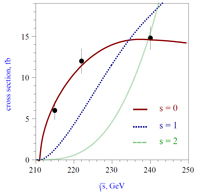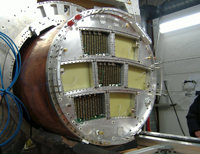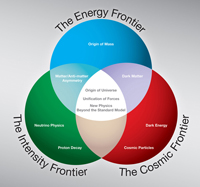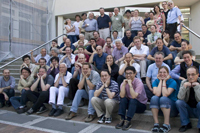 |
|
|
 |
Optimal ILC physics performance at acceptable cost and risk
This month's Research Director's Report was written by Jim Brau, co-chair of the Worldwide Study and regional detector contact for the Americas.

A widely used example of the unique physics capability of the linear collider is the determination of the Higgs boson spin through the measurement of the Higgstrahlung threshold cross section. This plot from the simulation study of Dova, Garcia-Abia and Lohmann illustrates this. |
Several years ago, the international community reached a widely held understanding that a linear collider will be needed to study the underlying physics of the new phenomena expected to be discovered at the Large Hadron Collider (LHC). More than 2700 scientists signed the 2003 statement "Understanding Matter, Energy, Space and Time: the Case for the Linear Collider." This statement expressed the world-wide consensus for a linear collider with the necessary features that would enable the excellent physics programme envisioned. It emphasised the understanding of the Higgs boson, and new discoveries beyond the Standard Model, with emphasis on the benefit of precision measurements and the interplay of LHC and the linear collider. Also expressed were the many cross connections between linear collider experiments, neutrino and quark studies, cosmological and astrophysical measurements, and high-energy nuclear physics.
Read more...
-- Jim Brau
Research Director's Report Archive |
 |
|
|
 |
|
Not going to ICHEP? You can still follow what's going on in the sessions in the ICHEP blog
|
| Upcoming meetings, conferences, workshops
7th Positron Source Collaboration Meeting
DESY, Hamburg, Germany
15-16 July 2010
TeV Particle Astrophysics 2010
Paris, France
19-23 July 2010
35th International Conference on High Energy Physics (ICHEP2010)
Palais des Congrès, Paris, France
21-28 July 2010
First Baseline Assessment Workshop
KEK, Tsukuba, Japan
7-10 September 2010
XXV Linear Accelerator Conference (LINAC10)
Tsukuba, Japan
12-17 September 2010
Upcoming school
Fifth CERN-Fermilab Hadron Collider Physics Summer School
Fermilab, Batavia, IL, USA
16-27 August 2010
|
|
|
GDE Meetings calendar
View complete ILC calendar
|
|
|
 |
The German way to the forum

Many different institutes and labs in Germany are involved in the development of a time projection chamber (TPC) for the ILD detector. |
Some ideas are so good that you have to export them when you move from one country to the other. This is especially the case in a global project like the ILC, where three regions and people from all over the place work together to make sure that whatever the LHC will find, the next generation of particle accelerators can study in detail. So when theorist Gudrid Moortgat-Pick moved from Durham, UK, to Hamburg, Germany, she took the concept of the interdisciplinary linear collider forum with her to create it in Germany. The first meeting of the new working group took place at DESY in June.
Read more...
-- Barbara Warmbein |
 |
|
|
 |
From PhysOrg.com
13 July 2010
Big science future for Australia
"...This collaboration will support exciting developments in Australian research and innovation, with projects proposed including development of [...] a linear collider, in which scientists will be able to probe, in finer detail, the discoveries of the Large Hadron Collider and in doing so, unlock the mechanisms of matter and how it was formed in the universe..."
Read more... |
|
From SLAC Today
12 July 2010
Search Under Way for SLAC Communications Director
With many a "thank you" for nearly two years of leadership, the SLAC Communications Office has bid farewell to Rob Brown, who stepped down this month as Director of Communications.
Read more... |
|
From New York Times
12 July 2010
For a Proton, a Little Off the Top (or Side) Could Be Big Trouble
For most of us, 4 percent off around the waist – a couple of belt notches – would be a great triumph.
Read more... |
|
From Discovery News
12 July 2010
HIGGS BOSON DISCOVERED? NOT SO FAST.
The particle physics community is buzzing about a blog posted by a University of Padua (Italy) physicist saying that he's been hearing rumors about a "light Higgs boson" discovery at the Fermi National Accelerator Laboratory (Fermilab) in Batavia, Illinois.
Read more... |
|
From New Scientist
9 July 2010
Higgs boson: is a result imminent?
Could the elusive Higgs boson finally be in sight? On his blog, physicist Tommaso Dorigo of the University of Padua writes about talk of a tentative hint of the Higgs at the Tevatron, a particle accelerator at the Fermi National Accelerator Laboratory in Batavia, Illinois.
Read more... |
|
From SLAC
9 July 2010
Jonathan Dorfan, SLAC Professor and Director Emeritus, to Lead New Graduate University in Japan
Menlo Park, Calif. – Dr. Jonathan Dorfan has been named president-elect of the Okinawa Institute of Science and Technology (OIST) Graduate University. Dorfan is a SLAC professor of physics and former director of the Department of Energy's Stanford Linear Accelerator Center, now renamed SLAC National Accelerator Laboratory.
Read more... |
|
From University of Chicago
7 July 2010
Piermaria Oddone reappointed to second term as director of Fermilab
The Fermi Research Alliance, LLC, Board of Directors announced Wednesday the reappointment of Piermaria Oddone to a second five-year term as director of Fermi National Accelerator Laboratory.
Read more... |
|
|
 |
 |
|
|
 |
Japan to provide funds towards the Super KEKB upgrade

The frontiers of particle physics. The KEK SuperB machine will help extend the intensity frontier |
High-energy physics got a substantial boost last month when MEXT (Ministry of Education, Culture, Sports, Science and Technology), the Japanese ministry that supports high-energy physics at KEK, announced that it will appropriate 10 billion yen (around 110 million dollars) towards the upgrade of KEKB over the three years starting this fiscal year. This new investment is welcome news, as it both will further an especially productive research area (B physics) and more generally the 'intensity' frontier. Recent strategic plans for the future of particle physics have emphasised the importance of a multi-prong approach, with the main areas being the energy frontier with the LHC and hopefully a future linear collider, as well as the intensity frontier with one element being a SuperB factory, and emerging cross-disciplinary probes in experimental particle astrophysics, called the cosmic frontier.
Read more...
-- Barry Barish
Director's Corner Archive |
 |
|
|
 |
Integrate

On the way towards the detector baseline design and functioning analyses with their detector the groups working on the ILD detector met at DESY at the beginning of the month. The meeting focused on software and integration issues. Read more about it in a future issue of ILC NewsLine.
|
ILC-CLIC meeting at CERN: registration is open
You can now register to the next workshop on Linear e+e- Colliders organised at CERN by the European Committee for Future Accelerators (ECFA), 18 - 22 October, here.
This workshop will study the physics, detectors and accelerator complex of a linear collider covering both CLIC and ILC options.
arXiv preprints
1007.2102
Higgs boson hadronic branching ratios at the ILC
1007.1918
Rare Z-decay into light CP-odd Higgs bosons: a comparative study in different new physics models
1007.1321
Measuring Supersymmetry
|
|

